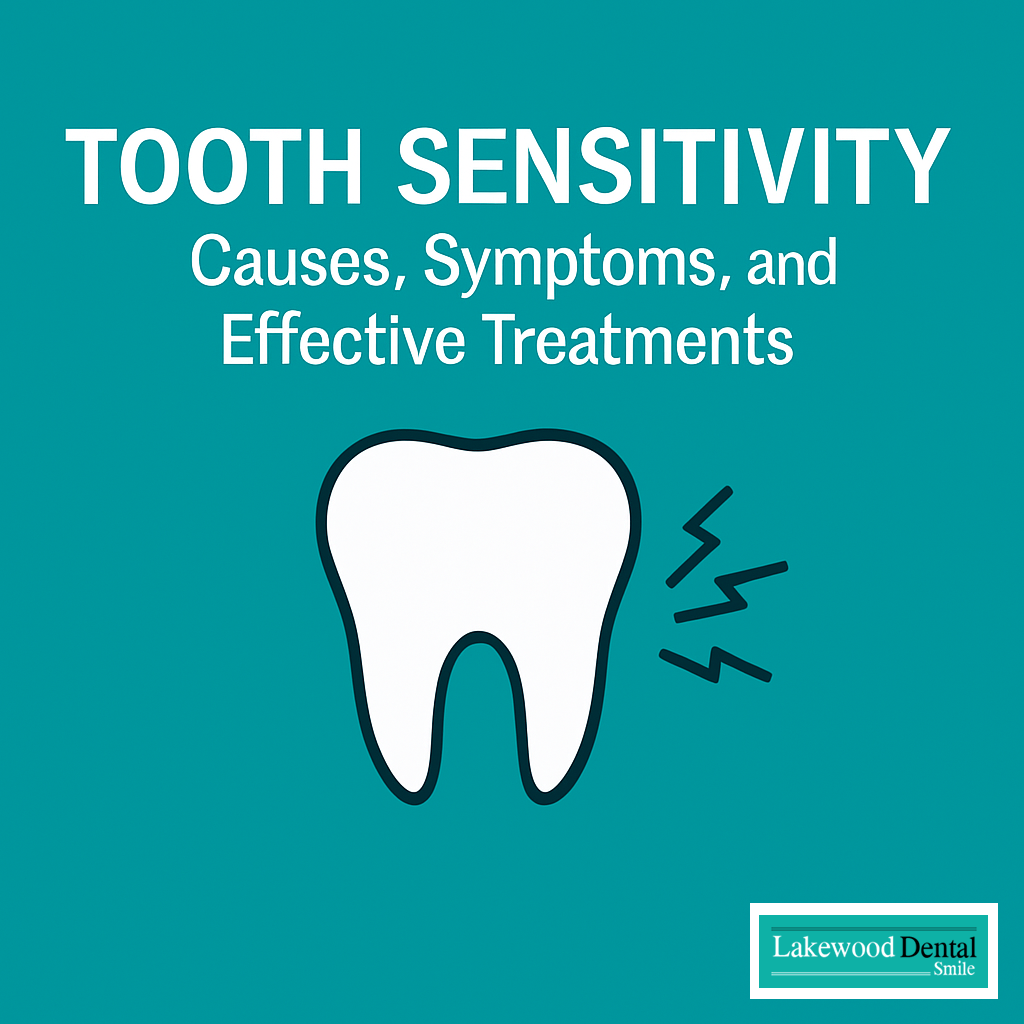Have you ever winced in pain while sipping a hot drink or biting into ice cream? That sudden jolt could be a sign of tooth sensitivity. It’s one of the most common dental issues and can affect anyone, from teens to older adults. This discomfort usually appears as a sharp, temporary pain when teeth are exposed to hot, cold, sweet, or acidic foods and drinks.
While tooth sensitivity might seem minor, it’s often a signal that something deeper needs attention — such as enamel erosion, gum recession, or tooth decay. Understanding what causes it and how to treat it is key to maintaining long-term oral comfort and health.

What Causes Tooth Sensitivity?
Tooth sensitivity happens when the protective enamel layer on your teeth wears down, exposing the inner dentin layer. The dentin contains microscopic tubules that connect directly to the tooth’s nerves. When exposed, these nerves react strongly to temperature or pressure changes.
Common causes include:
- Enamel erosion from acidic foods, sodas, or aggressive brushing.
- Tooth decay or cavities that expose dentin.
- Gum recession, which leaves the root surface unprotected.
- Cracked or chipped teeth that allow stimuli to reach nerves.
- Grinding or clenching (bruxism) that wears down enamel.
- Frequent whitening treatments that temporarily increase sensitivity.
Recognizing the Symptoms
The main symptom of tooth sensitivity is sharp pain when teeth encounter certain triggers — hot coffee, cold water, sweet snacks, or even cool air. The discomfort usually fades once the stimulus is gone. However, if it lingers or intensifies, it could mean deeper enamel loss or infection requiring professional care.
7 Powerful Ways to Stop the Pain Fast
1. Use a desensitizing toothpaste – Specially formulated to block nerve pathways and reduce pain over time.
2. Switch to a soft-bristled toothbrush – Gentle brushing helps protect enamel and gums.
3. Avoid acidic foods and drinks – Limit citrus fruits, carbonated beverages, and vinegar-based foods.
4. Practice gentle brushing – Use small circular motions instead of harsh back-and-forth scrubbing.
5. Use fluoride treatments – Strengthens enamel and reduces nerve exposure.
6. Wear a mouthguard at night – Prevents enamel damage from grinding or clenching.
7. Visit your dentist regularly – Professional cleaning and treatment identify the root cause of tooth sensitivity early.
Professional Treatments for Tooth Sensitivity
If home care doesn’t provide relief, your dentist may recommend:
- Fluoride varnishes or gels to rebuild enamel.
- Bonding or sealants to cover exposed dentin.
- Gum grafting if recession is the cause.
- Root canal therapy in severe cases where nerve exposure is extensive.
These treatments not only relieve tooth sensitivity but also prevent further damage.
Preventing Future Sensitivity
Long-term prevention is about daily habits. Use a fluoride toothpaste, maintain proper brushing techniques, and avoid frequent acidic or sugary snacks. Replace your toothbrush every three months and attend regular dental checkups.
Most importantly, don’t ignore mild sensitivity — early care can prevent advanced decay, gum issues, or permanent enamel damage.
When to See a Dentist
If your tooth sensitivity pain lasts for more than a few days, worsens, or prevents you from eating comfortably, schedule a dental appointment. A professional can pinpoint whether the issue is enamel wear, gum disease, or another underlying problem.
Final Thoughts
Tooth sensitivity is more than an occasional discomfort — it’s a signal your teeth need care and protection. With proper hygiene, mindful eating, and timely dental visits, you can stop the pain fast and keep your smile strong for years to come.
If you’re struggling with tooth sensitivity or persistent discomfort, consider visiting Lakewood Dental Smile for expert diagnosis and personalized treatment. Our experienced dental team offers advanced care to relieve sensitivity and restore your long-term oral comfort. Our team at Lakewood Dental Smile is committed to helping you enjoy lasting relief from tooth sensitivity through gentle and effective care.




